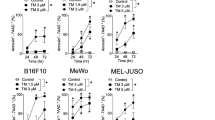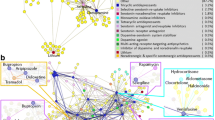Abstract
Background
Antidepressant drugs, like fluoxetine, a selective serotonin reuptake inhibitor, desipramine, a nonselective noradrenaline reuptake inhibitor, and mirtazapine, an antagonist of noradrenaline α2 auto- and heteroreceptors, are widely used for the treatment of depressive symptoms in cancer patients. Since these antidepressants have different activities targeting the immune system, they might also modulate tumor growth in cancer patients.
Methods
In the present study, we investigated the effects of administration of antidepressant drugs: fluoxetine, desipramine and mirtazapine on B16F10 melanoma tumor growth. These drugs were administered intraperitoneally (ip) for 17 days after subcutaneous injection of B16F10 melanoma cells to male C57BL/6J mice
Results
Fluoxetine significantly inhibited melanoma solid tumor growth and desipramine tended to decrease this parameter whereas mirtazapine had no effect.
Conclusion
The inhibitory effect of fluoxetine on melanoma growth was associated with an increased mitogen-induced T cell proliferation which may at least partly participate in the mechanism of the antitumor effect of this antidepressant. It appears that the inhibitory effect of fluoxetine on tumor growth is not related with changes in cytokine levels except for IL-10.
Similar content being viewed by others
References
Abdul M, Logothetis CJ, Hoosein NM: Growth-inhibitory effects of serotonin uptake inhibitors on human prostate carcinoma cell lines. J Urol, 1995, 154, 247–250.
Arimochi H, Morita K: Characterization of cytotoxic actions of tricyclic antidepressants on human HT29 colon carcinoma cells. Eur J Pharmacol, 2006, 541, 17–23.
Bendele RA, Adams ER, Hoffman WP, Gries CL, Morton DM: Carcinogenicity studies of fluoxetine hydrochloride in rats and mice. Cancer Res, 1992, 52, 6931–6935.
Bilir A, Erguven M, Oktem G, Ozdemir A, Uslu A, Aktas E, Bonavida B: Potentiation of cytotoxicity by combination of imatinib and chlorimipramine in glioma. Int J Oncol, 2008, 32, 829–839.
Brunda MJ, Wright RB, Luistro L, Harbison ML, Anderson TD, McIntyre KW: Enhanced antitumor efficacy in mice by combination treatment with interleukin-1 alpha and interferon-alpha. J Immunother Emphasis Tumor Immunol, 1994, 15, 233–241.
Bymaster FP, Zhang W, Carter PA, Shaw J, Chernet E, Phebus L, Wong DT, Perry KW: Fluoxetine, but not other selective serotonin uptake inhibitors, increases norepinephrine and dopamine extracellular levels in prefrontal cortex. Psychopharmacology (Berl), 2002, 160, 353–361.
Chlebda E, Merwid-Ląd A, Szumny D, Trocha M, Fereniec-Gołębiewska L, Gębarowska E, Kowalski P, Szeląg A: Antitumor effect of macrolides - erythromycin and roxithromycin in B16 melanoma-transplanted mice. Pharmacol Rep, 2007, 59, 269–274.
De Galdeano AG, Boyano D, Cañavate L: Effect induced by interleukin-1 on the behaviour of B16F10 melanoma cells. Oncol Rep, 1999, 6, 225–228.
Fisch M: Treatment of depression in cancer. J Natl Cancer Inst Monogr, 2004, 32, 105–111.
Frick LR, Palumbo ML, Zappia MP, Brocco MA, Cremaschi GA, Genaro AM: Inhibitory effect of fluoxetine on lymphoma growth through the modulation of antitumor T-cell response by serotonin-dependent and independent mechanisms. Biochem Pharmacol, 2008, 75, 1817–1826.
García-Hernández ML, Hernández-Pando R, Gariglio P, Berumen J: Interleukin-10 promotes B16-melanoma growth by inhibition of macrophage functions and induction of tumour and vascular cell proliferation. Immunology, 2002, 105, 231–243.
Gil-Ad I, Zolokov A, Lomnitski L, Taler M, Bar M, Luria D, Ram E, Weizman A: Evaluation of the potential anti-cancer activity of the antidepressant sertraline in human colon cancer cell lines and in colorectal cancer-xenografted mice. Int J Oncol, 2008, 33, 277–286.
Greene J, Banasr M, Lee B, Warner-Schmidt J, Duman RS: Vascular endothelial growth factor signaling is required for the behavioral actions of antidepressant treatment: pharmacological and cellular characterization. Neuropsychopharmacology, 2009, 34, 2459–2468.
Han YS, Lee CS: Antidepressants reveal differential effect against 1 -methyl-4-phenylpyridinium toxicity in differentiated PC12 cells. Eur J Pharmacol, 2009, 604, 36–44.
Krishnan A, Hariharan R, Nair SA, Pillai MR: Fluoxetine mediates G0/G1 arrest by inducing functional inhibition of cyclin dependent kinase subunit (CKS)1. Biochem Pharmacol, 2008, 75, 1924–1934.
Kubera M, Grygier B, Arteta B, Urbańska K, Basta-Kaim A, Budziszewska B, Leśkiewicz M et al.: Age-dependent stimulatory effect of desipramine and fluoxetine pretreatment on metastasis formation by B16F10 melanoma in male C57BL/6 mice. Pharmacol Rep, 2009, 61, 1113–1126.
Kubera M, Grygier B, Urbańska K, Arteta B, Leśkiewicz M, Basta-Kaim A, Budziszewska B et al.: Inhibitory effect of fluoxetine on S91 melanoma growth in DBA mice. Cent Eur J Immun, 2008, 33, Suppl 1, 40.
Kubera M, Holan V, Mathison R, Maes M: The effect of repeated amitriptyline and desipramine administration on cytokine release in C57BL/6 mice. Psychoneuroendocrinology, 2000, 25, 785–797.
Kubera M, Simbirtsev A, Mathison R, Maes M: Effects of repeated fluoxetine and Citalopram administration on cytokine release in C57BL/6 mice. Psychiatry Res, 2000, 96, 255–266.
Levkovitz Y, Gil-Ad I, Zeldich E, Dayag M, Weizman A: Differential induction of apoptosis by antidepressants in glioma and neuroblastoma cell lines: evidence for p-c-Jun, cytochrome c, and caspase-3 involvement. J Mol Neuro-sci, 2005, 27, 29–42.
Lieb J: Antidepressants, eicosanoids and the prevention and treatment of cancer. A review. Prostaglandins Leukot Essent Fatty Acids, 2001, 65, 233–239.
Lieb J: Antidepressants, prostaglandins and the prevention and treatment of cancer. A review. Med Hypotheses, 2007, 69, 684–689.
Lloyd-Williams M, Shiels C, Taylor F, Dennis M: Depression-an independent predictor of early death in patients with advanced cancer. J Affect Disord, 2009, 113, 127–132.
Luo F, Yee JK, Huang SH, Wu LT, Jong AY: Downregulation of human Cdc6 protein using a lentivirus RNA interference expression vector. Methods Mol Biol, 2006, 342, 287–293.
Massie MJ: Prevalence of depression in patients with cancer. J Natl Cancer Inst Monogr, 2004, 32, 57–71.
Miknyoczki SJ, Lang D, Huang L, Klein-Szanto AJ, Dionne CA, Ruggeri BA: Neurotrophins and Trk receptors in human pancreatic ductal adenocarcinoma: expression patterns and effects on in vitro invasive behavior. Int J Cancer, 1999, 81, 417–427.
Milijkovic D, Markovic M, Bogdanovic N, Mostarica Stojkovic M, Trajkovic D: Necrotic tumor cells oppositely affect nitric oxide production in tumor cell lines and macrophages. Cell Immunol, 2002, 215, 72–77.
Nagai H, Hara I, Horikawa T, Oka M, Kamidono S, Ichi-hashi M: Gene transfer of secreted-type modified interleukin-18 gene to B16F10 melanoma cells suppresses in vivo tumor growth through inhibition of tumor vessel formation. J Invest Dermatol, 2002, 119, 541–548.
Ng CG, Boks MP, Zainal NZ, de Wit NJ: The prevalence and pharmacotherapy of depression in cancer patients. J Affect Disord, 2011, 131, 1–7.
Rodin G, Katz M, Lloyd N, Green E, Mackay JA, Wong RK: Treatment of depression in cancer patients. Curr Oncol, 2007, 14, 180–188.
Serafeim A, Holder MJ, Grafton G, Chamba A, Drayson MT, Luong QT, Bunce CM et al.: Selective serotonin reuptake inhibitors directly signal for apoptosis in biopsy-like Burkitt lymphoma cells. Blood, 2003, 101, 3212–3219.
Soengas MS, Lowe SW: Apoptosis and melanoma chemoresistance. Oncogene, 2003, 22, 3138–3151.
Spanová A, Kováru H, Lisá V, Lukásová E, Rittich B: Estimation of apoptosis in C6 glioma cells treated with antidepressants. Physiol Res, 1997, 46, 161–164.
Spiegel D: Mind matters in cancer survival. Psychooncology, 2012, 21, 588–593.
Steingart AB, Cotterchio M: Do antidepressants cause, promote, or inhibit cancers? A review. J Clin Epidemiol, 1995, 48, 1407–1412.
Stepulak A, Rzeski W, Sifringer M, Brocke K, Gratopp A, Kupisz K, Turski L, Ikonomidou C: Fluoxetine inhibits the extracellular signal regulated kinase pathway and suppresses growth of cancer cells. Cancer Biol Ther, 2008, 7, 1685–1693.
Sternbach H: Are antidepressants carcinogenic? Are-view of preclinical and clinical studies. J Clin Psychiatry, 2003, 64, 1153–1162.
Tutton PJ, Barkla DH: Effect of an inhibitor of noradrenaline uptake, desipramine, on cell proliferation in the intestinal crypt epithelium. Virchows Arch B Cell Pathol Incl Mol Pathol, 1989, 57, 349–352.
Warner-Schmidt JL, Duman RS. VEGF is an essential mediator of the neurogenic and behavioral actions of antidepressants. Proc Natl Acad Sci USA, 2007, 104, 4647–4652.
Zhang W, Lu Y, Xu B, Wu J, Zhang L, Gao M, Zheng S et al.: Acidic mucopolysaccharide from holothuria leu-cospilota has antitumor effect by inhibiting angiogenesis and tumor cell invasion in vivo and in vitro. Cancer Biol Ther, 2009, 8, 1489–1499.
Author information
Authors and Affiliations
Corresponding author
Rights and permissions
About this article
Cite this article
Grygier, B., Arteta, B., Kubera, M. et al. Inhibitory effect of antidepressants on B16F10 melanoma tumor growth. Pharmacol. Rep 65, 672–681 (2013). https://doi.org/10.1016/S1734-1140(13)71045-4
Received:
Revised:
Accepted:
Published:
Issue Date:
DOI: https://doi.org/10.1016/S1734-1140(13)71045-4




